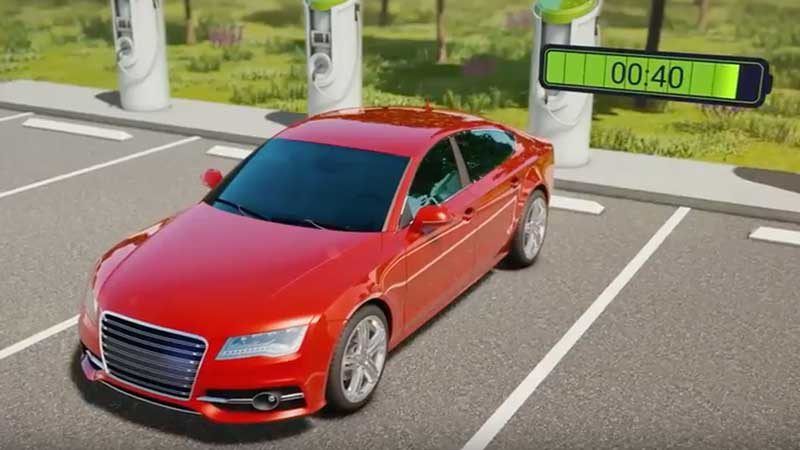UK oil giant British Petroleum has plans to make charging an electric car as close as possible to refuelling a regular fossil-fuelled vehicle.
In a recent interview, BP’s head of technology David Eyton said that it wants to provide batteries for electric cars by 2021 that can charge to 100% within just five minutes.
BP, like fellow oil and petrol majors Shell and Caltex, know that in the very least, they must embrace the shift to electric mobility, and as such are making strategic investments to grab a piece of the growing charging infrastructure market.
In the electric vehicle playing field, BP has made two investments in the past 12 months or so with which it hopes to position itself: the purchase of UK charging infrastructure provider BP Chargemaster and an investment in an obscure but promising Israeli lithium-ion battery developer called StoreDot.
The buyout of BP Chargemaster, which currently manages 6,500 charging points across the island nation, is part of a larger goal to remain a main player on the global fuel provider (BP is installing 60kW fast-chargers in China, and 150kW chargers in Germany and the UK).
However, the funds injection into StoreDot has a related but different goal.
Speaking with Bloomberg New Energy Finance, Eyton says that BP’s focus for EVs is on how fast people can charge their cars.
While a 150kW charger can add 100km range to an electric car in five minutes, “Longer-term, we’d like to be able to give you more than 100km in five minutes,” says Eyton.
“That technology isn’t commercially available yet but we’ve invested in a company called StoreDot in Israel that we think has the best shot at making a new battery that will charge really fast – it’s a modified lithium-ion battery.
“Today, they are making batteries for phones that allow people to charge phones in a couple of minutes.
“Our aim is to have a battery in a car by 2021 that can be charged completely in 5 minutes – for a lot more than 100km,” he says.
To date, StoreDot have demonstrated their li-ion tech works for mobile phones and electric scooters, with plans to start selling five minute chargers for mobile phones by mid-2020.
At a recent demonstration in Tel Aviv in June, StoreDot’s tech added charged the flat battery of an electric scooter in 5 minutes, showing that the tech can also be used for larger applications.
Granted, the demonstration in question added just 70km in that five minutes – slower than BP’s own 150kW chargers.
StoreDot claims however on its website that its battery tech, which uses “proprietary organic compounds” will have the ability to add range of up to 300 miles (482km) in just five minutes, “depending on the model of your EV” (the maximum charging rate of EVs differs from model to model).
In short, StoreDot’s batteries replace the inorganic compounds used in a standard li-ion battery cathode, which have limited ionic conductivity, with its own synthetic organic compounds which it says are able to charge at a much faster rate.
Per StoreDot’s own description:
Using a unique multifunction electrode (MFE), StoreDot’s FlashBattery combines two benefits of energy storage solutions, incorporating the high-power rapid-charging rate capability with the high-energy storage ability.
This optimized charging ability is achieved through an innovative electrode structure containing proprietary organic polymers with Metal Oxide compounds of the cathode that trigger the redox reactions.
This solution enables ions to flow from a modified anode to a modified cathode at a speed that is much faster than existing technologies. Together with a proprietary separator and electrolyte, this new architecture delivers a high current and low internal resistance, with enhanced energy density and a prolonged battery life.
What this means in essence is that should StoreDot’s vision come to fruition, BP could remain not only a mainstay in powering mobility, but also possibly become a battery provider to automakers.
When the investment into StoreDot was first announced in May 2018, BP chief Tufan Erginbiglic said in a statement that, “Ultra-fast charging is at the heart of BP’s electrification strategy. StoreDot’s technology shows real potential for car batteries that can charge in the same time it takes to fill a gas tank.”
“With our growing portfolio of charging infrastructure and technologies, we’re excited by our opportunities to develop truly innovative EV customer offers. We are committed to be the fuel provider of choice – no matter what car our customers drive.”

Bridie Schmidt is associate editor for The Driven, sister site of Renew Economy. She has been writing about electric vehicles since 2018, and has a keen interest in the role that zero-emissions transport has to play in sustainability. She has participated in podcasts such as Download This Show with Marc Fennell and Shirtloads of Science with Karl Kruszelnicki and is co-organiser of the Northern Rivers Electric Vehicle Forum. Bridie also owns a Tesla Model Y and has it available for hire on evee.com.au.

